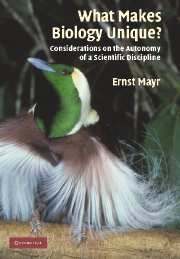Book contents
- Frontmatter
- Contents
- Preface
- Acknowledgments
- Introduction
- 1 Science and sciences
- 2 The autonomy of biology
- 3 Teleology
- 4 Analysis or reductionism?
- 5 Darwin's influence on modern thought
- 6 Darwin's five theories of evolution
- 7 Maturation of Darwinism
- 8 Selection
- 9 Do Thomas Kuhn's scientific revolutions take place?
- 10 Another look at the species problem
- 11 The origin of humans
- 12 Are we alone in this vast universe?
- Glossary
- Index
- References
Preface
Published online by Cambridge University Press: 10 December 2009
- Frontmatter
- Contents
- Preface
- Acknowledgments
- Introduction
- 1 Science and sciences
- 2 The autonomy of biology
- 3 Teleology
- 4 Analysis or reductionism?
- 5 Darwin's influence on modern thought
- 6 Darwin's five theories of evolution
- 7 Maturation of Darwinism
- 8 Selection
- 9 Do Thomas Kuhn's scientific revolutions take place?
- 10 Another look at the species problem
- 11 The origin of humans
- 12 Are we alone in this vast universe?
- Glossary
- Index
- References
Summary
This will be my last survey of controversial concepts in biology. I have previously published papers on nearly all these subjects, in some cases more than one. Indeed, an analysis of my bibliography reveals that I have discussed the species problem in no fewer than sixty-four of my publications, and have been involved in numerous controversies. What I now offer is a revised, more mature, version of my thoughts. I am not so optimistic to believe that I have settled all (or even most) of these controversies, but I do hope to have brought clarity into some rather confused issues.
What I do not understand is why most philosophers of science believe the problems of the philosophy of science can be solved by logic. Their interminable arguments, documented by whole issues of the journal Philosophy of Science, show that this is not the best way to reach a solution. An empirical approach (see, for example, chapter 3 for teleology and chapter 4 for reduction) seems to be a better way.
Indeed, this conclusion raises a legitimate question – whether the traditional approach of the philosophy of science is really the best possible one. This possibility must be faced if one plans to develop a philosophy of biology. The traditional approach is based on the assumption that biology is a science exactly like any of the physical sciences, but there is much evidence to question this assumption.
- Type
- Chapter
- Information
- What Makes Biology Unique?Considerations on the Autonomy of a Scientific Discipline, pp. ix - xiiPublisher: Cambridge University PressPrint publication year: 2004



